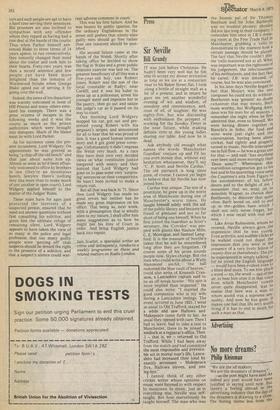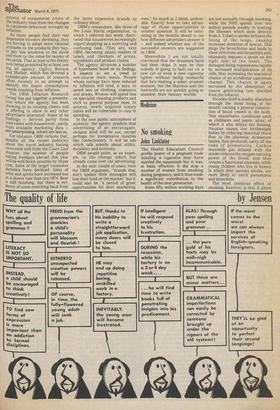Advertising
No more dreams?
Philip Kleinman
-We are the ad Makers,
We are the dreamers of dreams," —as the poet might have said. As indeed any poet would have been justified in saying until now. But there's a feeling abroad in the advertising industry that the day of the dreamers is drawing to a close. The feeling stems less from the
activity of consumerist critics of the industry than from the changes !n consumer behaviour wrought by inflation.
As many people find their real disposable incomes shrinking, they are having to adopt more rational attitudes to the products they buy, to pay less attention to the sizzle and more to the value for money of the steak. That at least is the theory now being promoted by at least one big ad agency, Ogilvy Benson and Mather, which has devoted a Considerable amount of research effort recently to an attempt to identify the major consumption trends resulting from inflation.
The OBM Inflation Research Group has put together a presentation which the agenty has been showing to its existing clients and IS offering to show to any other advertisers interested. Some of its findings — derived partly from interviews with housewives , partly from available marketing data — are unsurprising, others are less so.
For instance, OBM reckons that, despite all the recent publicity about the travel industry having recovered well from the Court Line disaster, the number of people taking holidays abroad this year will be well down, possibly by 10 per cent. Sales of the larger consumer durables have declined. Sales of wine and spirits have increased but at a slower rate than pre-1974. Beer Is still booming, but there is evidence of some switching back from the more expensive brands to ordinary bitter.
OEM's researchers, like those of the Louis Harris organisation, to which I referred last week, -discovered that housewives increasingly regard shopping as a worrying and confusing task. They are, says OBM, becoming astute readers of labels and checkers of prices, ingredients and product claims.
The agency advances a number of hypotheses based on its findings. It expects to see a trend to one-course main meals. People whose outings have been reduced by inflation will tend, it says, to spend less on clothing, cosmetics and drinks. Women will spend less on specialist cleaning products and stick to general purpose ones. In general, newly acquired luxury tastes will be vulnerable to cuts in spending.
In the new public atmosphere of austerity, the agency predicts that advertising of an extravagant, escapist kind will be out, except perhaps for inexpensive luxuries like confectionery. It will be ads which talk soberly about utility, durability and economy.
OBM people point, as an example, to the change which has already come over car advertising.
In the next couple of years, runs the OBM argument, "brands that don't update their strategies will, lose their hold on the market" but it could also be "a period of great opportunities for alert marketing men." So much is, I think, undeni:' able. Exactly how to take advantage of those opportunities is another question. It will be interesting in the months ahead to see how different advertisers answer it — and indeed whether any of the successful answers are suggested by OBM.
Meanwhile I am not totally convinced that the dreamers have had their chips. It may be that nobody is going to lash out on a new car or even a new cigarette lighter without being reassured that he's making a sober, prudent decision, but the Martinis and the Smirnoffs are not quickly going to abandon their fantasy worlds.











































 Previous page
Previous page